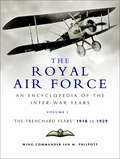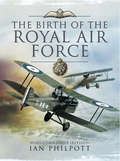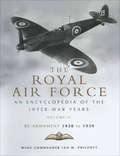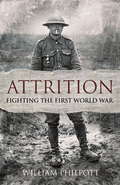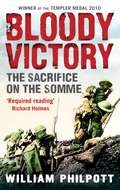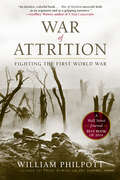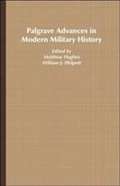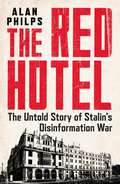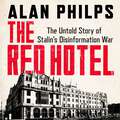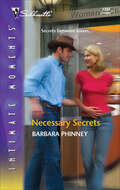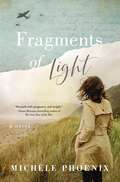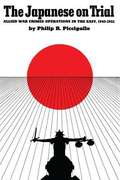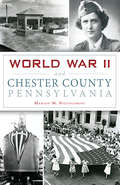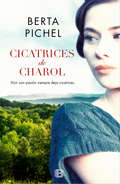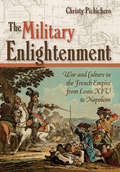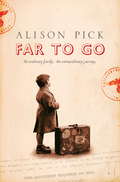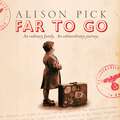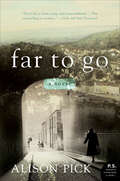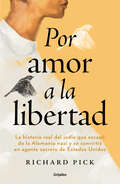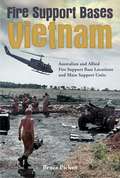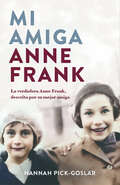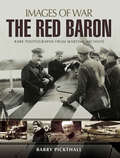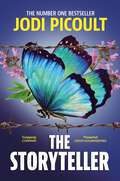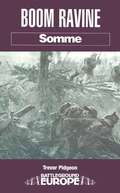- Table View
- List View
The Royal Air Force: An Encyclopaedia Of The Raf Between The Two World Wars - 1918 To 1929 (The Encyclopedia of the Inter-War Years #1)
by Ian PhilpottThe inter-war years between 1918 and 1939 saw the newly created Royal Air Force fighting for its very existence politically, being dispatched to the remotest corners of the British Empire and its Protectorates in various policing roles and then finally engaged in a headlong rush to modernize in the face of the new German Fascist regime that was threatening British and European freedom. Yet this important period in RAF history and its effect on political and military rationale during the period has never been completely documented. This exhaustive and comprehensive reference is the most detailed work to be published on the subject. The author gives full information on the changing structure of the Force during the period, squadron operations, political machinations and their effects, the airplanes and their equipment, the personnel, technical advances in navigation and breakthroughs achieved in engine performance. The book is cross-referenced throughout, extremely well illustrated and contains an abundance of location maps and other diagrams. This book will become a Bible for anyone interested in the history of the RAF.This work has been reviewed by personnel at the RAF Historical Branch who praise it.
The Birth of the Royal Air Force
by Ian M. PhilpottIan Philpott presents us here with a compendium of facts, operational histories and photo illustrations, combined to create a comprehensive account of the early years of the Royal Air Force. Illustrated throughout, it features details of all military operations from 1914 to 1918 which impacted upon the organisation. Also included are operational details of the Independent Bomber Force throughout 1918, a supplementary historical strand that is sure to appeal to Aviation enthusiasts with a taste for features of niche focus. Details of the airfields, landing grounds, seaplane bases and various other landmarks of this era are given, and readers are encouraged to use the work as a reference book, being as it is a weighty tome of encyclopedic scope. Sure to make a welcome addition to any aviation enthusiasts library, this well-researched piece of work has been a long time in the making. Philpott brings his typical flare to the project, leaving no stone unturned when it comes to this dynamic, defining period of Royal Air Force history.As featured in the East Kent Mercury and Essence Magazine.
The Royal Air Force: An Encyclopedia Of The Inter-war Years 1930-1939 (The Encyclopedia of the Inter-War Years #2)
by Ian M. PhilpottVolume II of this mammoth reference work covers the years in which the League of Nations failed because of the emerging dictatorships in Germany and Italy and the expansionist policies adopted by Japan. Britain was still reeling from the consequences of World War I and the RAF was sadly far behind the other major world powers in aircraft design, still relying on bi-planes that were direct descendants of World War I thinking. It gradually became apparent that, despite UK government dithering, the RAF needed to develop new aircraft, engines and increase production to confront the bully-boy tactics of the Axis powers. As the turn of the decade approached extraordinary measures were taken to enable RAF to defend Britain's skies and this her freedom. As with Volume 1, this book covers every conceivable part of the RAF's history through these pre-War days. It looks at the development and invention of new equipment such as radar, monoplane fighters, metal construction and the heavy bomber. This was an era when science in aviation was rushing ahead and fortunately for Britain's freedom, it laid the foundations of victory in 1.943
Attrition: Fighting the First World War
by William PhilpottThe First World War was too big to be grasped by its participants. In the retelling of their war in the competing memories of leaders and commanders, and the anguished fiction of its combatants, any sense of order and purpose, effort and achievement, was missing. Drawing on the experience of front line soldiers, munitions workers, politicians and those managing the vast economy of industrialised warfare, Attrition explains for the first time why and how this new type of conflict born out of industrial society was fought as it was. It was the first mass war in which the resources of the fully-mobilised societies strained every sinew in a conflict over ideals - and the humblest and highest were all caught up in the national enterprise. In a stunning narrative, this brilliant and necessary reassessment of the whole war cuts behind the myth-making to reveal the determination, organization and ambition on all sides.
Bloody Victory: The Sacrifice on the Somme and the Making of the Twentieth Century
by William Philpott1 July 1916: the first day of the Battle of the Somme. The hot, hellish day in the fields of northern France that has dominated our perception of the First World War for just shy of a century. The shameful waste; the pointlessness of young lives lost for the sake of a few yards; the barbaric attitudes of the British leaders; the horror and ignominy of failure. All have occupied our thoughts for generations. Yet are we right to view the Somme in this way?Drawing on a vast number of sources such as letters, diaries and numerous archives, Bloody Victory describes in vivid detail the physical conditions, the combat and exceptional bravery against the odds but it also, uniquely, captures how the Somme defined the twentieth century in so many ways. This is an utterly gripping new analysis of one of the most iconic campaigns in history.
Bloody Victory: The Sacrifice on the Somme and the Making of the Twentieth Century
by William Philpott1 July 1916: the first day of the Battle of the Somme. The hot, hellish day in the fields of northern France that has dominated our perception of the First World War for just shy of a century. The shameful waste; the pointlessness of young lives lost for the sake of a few yards; the barbaric attitudes of the British leaders; the horror and ignominy of failure. All have occupied our thoughts for generations. Yet are we right to view the Somme in this way?Drawing on a vast number of sources such as letters, diaries and numerous archives, Bloody Victory describes in vivid detail the physical conditions, the combat and exceptional bravery against the odds but it also, uniquely, captures how the Somme defined the twentieth century in so many ways. This is an utterly gripping new analysis of one of the most iconic campaigns in history.
War of Attrition: Fighting the First World War
by William Philpott“Philpott argues persuasively that the last hundred days of the war were the result of a steep learning curve necessitated by earlier bloodbaths.” —The Wall Street Journal A Wall Street Journal Best Non-Fiction Book of 2014! The Great War of 1914–1918 was the first mass conflict to fully mobilize the resources of industrial powers against one another, resulting in a brutal, bloody, protracted war of attrition between the world’s great economies. Now, one hundred years after the first guns of August rang out on the Western front, historian William Philpott reexamines the causes and lingering effects of the first truly modern war. Drawing on the experience of front line soldiers, munitions workers, politicians, and diplomats, War of Attrition explains for the first time why and how this new type of conflict was fought as it was fought; and how the attitudes and actions of political and military leaders, and the willing responses of their peoples, stamped the twentieth century with unprecedented carnage on—and behind—the battlefield. War of Attrition also establishes link between the bloody ground war in Europe and political situation in the wider world, particularly the United States. America did not enter the war until 1917, but, as Philpott demonstrates, the war came to America as early as 1914. By 1916, long before the Woodrow Wilson’s impassioned speech to Congress advocating for war, the United States was firmly aligned with the Allies, lending dollars and selling guns and opposing German attempts to spread submarine warfare. War of Attrition skillfully argues that the emergence of the United States on the world stage is directly related to her support for the conflagration that consumed so many European lives and livelihoods. In short, the war that ruined Europe enabled the rise of America.
Palgrave Advances in Modern Military History
by William J. Philpott Matthew HughesThis collection constitutes the definitive guide for advanced undergraduate and postgraduate students studying modern military history. It provides the reader with a clear and up-to-date survey of the significant debates, interpretations and historiographical shifts for a series of key themes in military history, ranging from the fifteenth to the twenty-first centuries, and across the technological, political, social, and cultural dimensions of military history.
The Red Hotel: The Untold Story of Stalin’s Disinformation War
by Alan Philps'A riveting trip down the corridors of Soviet deception' Sunday Telegraph (Five-Star Review)In THE RED HOTEL: THE UNTOLD STORY OF STALIN'S DISINFORMATION WAR, former Daily Telegraph Foreign Editor and Russian expert Alan Philps sets out the way Stalin created his own reality by constraining and muzzling the British and American reporters covering the Eastern front during the war and forcing them to reproduce Kremlin propaganda. War correspondents were both bullied and pampered in a gilded cage of the Metropol Hotel. They enjoyed lavish supplies of caviar and had their choice of young women to employ as translators and to share their beds.While some of these translators turned journalists into robotic conveyors of Kremlin propaganda, others were brave secret dissenters who whispered to reporters the reality of Soviet life and were punished with sentences in the Gulag. Through the use of British archives and Russian sources, the story of the role of the women of the Metropol Hotel and the foreign reporters they worked with is told for the first time. With a riveting narrative very much in the same wheelhouse as Ben McIntyre's Agent Sonya this revelatory story will finally lift the lid on Stalin's operation to muzzle and control what the western allies' writers and foreign correspondents knew of his regime's policies to prosecute the war against Hitler's rampaging armies from June 1941 onwards.
The Red Hotel: The Untold Story of Stalin’s Disinformation War
by Alan PhilpsIn THE RED HOTEL: THE UNTOLD STORY OF STALIN'S DISINFORMATION WAR, former Daily Telegraph Foreign Editor and Russian expert Alan Philps sets out the way Stalin created his own reality by constraining and muzzling the British and American reporters covering the Eastern front during the war and forcing them to reproduce Kremlin propaganda. War correspondents were both bullied and pampered in a gilded cage of the Metropol Hotel. They enjoyed lavish supplies of caviar and had their choice of young women to employ as translators and to share their beds. While some of these translators turned journalists into robotic conveyors of Kremlin propaganda, others were brave secret dissenters who whispered to reporters the reality of Soviet life and were punished with sentences in the Gulag. Through the use of British archives and Russian sources, the story of the role of the women of the Metropol Hotel and the foreign reporters they worked with is told for the first time. With a riveting narrative very much in the same wheelhouse as Ben McIntyre's Agent Sonya this revelatory story will finally lift the lid on Stalin's operation to muzzle and control what the western allies' writers and foreign correspondents knew of his regime's policies to prosecute the war against Hitler's rampaging armies from June 1941 onwards.(P) 2023 Headline Publishing Group Ltd
Necessary Secrets
by Barbara PhinneyWarrant Officer Sylvie Mitchell had resolved to put her last top secret military assignment behind her. Then Jon Cahill, her unborn baby's uncle, showed up, demanding answers about his brother's death in the line of fire. Answers that a government oath--and Sylvie's own guilt--wouldn't allow her to give...Jon was as determined to be her child's father figure as he was to learn about the fatal night Sylvie became pregnant. But despite the risk to her secrets, she soon found comfort in the sexy cop's passionate embraces. Would the one man who could chase away Sylvie's demons still want to be a part of her life when the painful truth was revealed?
Fragments of Light
by Michele PhoenixAn impossible decision in the chaos of D-Day. Ripples that cascade seventy-five years into the present. And two lives transformed by the tenuous resolve to reach out of the darkness toward fragments of light. Cancer stole everything from Ceelie—her peace of mind, her self-image, perhaps even her twenty-three-year marriage to her college sweetheart, Nate. Without the support of Darlene, her quirky elderly friend, she may not have been able to endure so much loss.So when Darlene&’s prognosis turns dire, Ceelie can&’t refuse her seemingly impossible request—to find a WWII paratrooper named Cal, the father who disappeared when Darlene was an infant, leaving a lifetime of desolation in his wake.The search that begins in the farmlands of Missouri eventually leads Ceelie to a small town in Normandy, where she uncovers the harrowing tale of the hero who dropped off-target into occupied France.Alternating between Cal&’s D-Day rescue by two young French sisters and Ceelie&’s present-day journey through trial and heartbreak, Fragments of Light poses a timeless question: When life becomes unbearable, will you press toward the light or let the darkness win?Praise for Fragments of Light&“With depth of emotion and vivid images of a war-torn WWII world, Fragments of Light nails down the achingly real in a character&’s journey, tackling both raw and poignant moments from a practiced pen. Michele Phoenix shines a spotlight on God&’s chasm-crossing persistence to rebuild the shattered places of our lives—and the people He uses to do it—no matter how much time has passed between brokenness and the quest for healing. Readers will root for Ceelie and Nate long after they&’ve turned the last page!&” —Kristy Cambron, bestselling author of The Butterfly and the Violin and the Lost Castle novels&“Michèle Phoenix skillfully explores the strength and resiliency of the human spirit but also its heartbreaking limits. Brimming with expertly researched wartime details, Fragments of Light abounds with poignancy and insight.&” —Susan Meissner, bestselling author of The Last Year of the War&“Ceelie&’s anguish and hope, Darlene&’s spunk and pain, and Cal&’s courage and conviction—all of it combines to create a story as beautiful as it is heartbreaking. In short, I loved this book!&” —Lauren Denton, USA TODAY bestselling author of The Hideaway and The Summer House&“A compelling story across time of love, loss, and what happens when tragedy strikes." —Katherine Reay, bestselling author of Dear Mr. Knightley and The Printed Letter Bookshop&“An immersive and unforgettable treatise on the power of love in all of its manifestations." —Rachel McMillon, author of The London Restoration&“It&’s not often a story moves me as Fragments of Light has. With a rare and honest voice, Michèle Phoenix weaves a story of heroes from yesteryear and also those from your neighborhood—each with hearts of valor—as they endure the fight of their lives." —Elizabeth Byler Younts, Carol Award–winning author of The Solace of Water
The Japanese on Trial: Allied War Crimes Operations in the East, 1945-1951
by Philip R. PiccigalloThis comprehensive treatment of post-World War II Allied war crimes trials in the Far East is a significant contribution to a neglected subject. While the Nuremberg and, to a lesser degree, Tokyo tribunals have received considerable attention, this is the first full-length assessment of the entire Far East operation, which involved some 5,700 accused and 2,200 trials. After discussing the Tokyo trial, Piccigallo systematically examines the operations of each Allied nation, documenting procedure and machinery as well as the details of actual trials (including hitherto unpublished photographs) and ending with a statistical summary of cases. This study allows a completely new assessment of the Far East proceedings: with a few exceptions, the trials were carefully and fairly conducted, the efforts of defense counsel and the elaborate review procedures being especially noteworthy. Piccigallo's approach to this emotion-filled subject is straightforward and evenhanded throughout. He concludes with a discussion of the broader implications of such war crimes trials, a matter of interest to the general reader as well as to specialists in history, law, and international affairs.
World War II and Chester County, Pennsylvania (Military)
by Marion M. PiccolominiRegiments from Chester County fought bravely in all theaters of World War II, while locals at home took extraordinary measures to support the Allies. West Chester resident G. Raymond Rettew developed a process to mass produce vitally needed penicillin while a peaceful farm transformed into the bustling Valley Forge General Hospital in 1943. Women entered labor positions at companies, including Lukens Steel, to meet production demands. The Coatesville YMCA created and distributed a newsletter to soldiers so the boys on the front had the news from back home. Author Marion Piccolomini celebrates the resilience and perseverance of Chester County residents in the midst of total war.
Cicatrices de charol
by Berta PichelUna novela de amor y superación ambientada en los albores de la guerra civil. Nía es una joven de dieciocho años que sueña con ser actriz mientras su vida transcurre en la comarca del Bierzo bajo la sombra protectora de su madre, una mujer muy conservadora. Cuando la protagonista conoce a Valeriano, un activista de la UGT, se lanza a un romance lleno de pasión que la obligará a hacer frente a los prejuicios de una sociedad convulsa y abocada a la guerra. Una historia de crecimiento, de superación, de ideales y amores de juventud, en la que Nía tendrá que vencer un obstáculo tras otro hasta lograr convertirse en la mujer que desea ser.
The Military Enlightenment: War and Culture in the French Empire from Louis XIV to Napoleon
by Christy L. PichicheroThe Military Enlightenment brings to light a radically new narrative both on the Enlightenment and the French armed forces from Louis XIV to Napoleon. Christy Pichichero makes a striking discovery: the Geneva Conventions, post-traumatic stress disorder, the military "band of brothers," and soldierly heroism all found their antecedents in the eighteenth-century French armed forces.Readers of The Military Enlightenment will be startled to learn of the many ways in which French military officers, administrators, and medical personnel advanced ideas of human and political rights, military psychology, and social justice.
Far to Go: A Novel (P. S. Ser.)
by Alison PickFor readers of THE TATTOOIST OF AUSCHWITZ and SCHINDLER'S LIST, FAR TO GO is a powerful, mesmerising novel centring on one family's heartbreaking decision to save their son - by saying goodbye to him for ever.Longlisted for the 2011 MAN BOOKER PRIZE for Fiction'Extraordinary' Daily Mail 'A potential classic in the making' Financial TimesPepik is only six when the German forces invade Czechoslovakia. Desperate to find freedom, his affluent Jewish parents try to escape with him to Paris, but are betrayed by Marta, the family's beloved nanny. Yet it is Marta who then secures a place for the Pepik on a Kindertransport, an act of determination that saves his life. But the child is never to see his parents or Marta again.'Somewhere between a book and a miracle' Catherine Ryan Hyde
Far to Go
by Alison PickLonglisted for the 2011 MAN BOOKER PRIZE for Fiction, FAR TO GO is a powerful and profoundly moving story about one family's epic journey to flee the Nazi occupation of their homeland in 1939, and above all to save the life of a six-year-old boy. Pavel and Anneliese Bauer are affluent, secular Jews, whose lives are turned upside down by the arrival of the German forces in Czechoslovakia. Desperate to avoid deportation, the Bauers flee to Prague with their six-year-old son, Pepik, and his beloved nanny, Marta. When the family try to flee without her to Paris, Marta betrays them to her Nazi boyfriend. But it is through Marta's determination that Pepik secures a place on a Kindertransport, though he never sees his parents or Marta again. Inspired by Alison Pick's own grandparents who fled their native Czechoslovakia for Canada during the Second World War, FAR TO GO is a deeply personal and emotionally harrowing novel.
Far to Go: A Novel
by Alison PickThe Man Booker Prize finalist Far to Go by acclaimed author Alison Pick is historical fiction at its very best.When Czechoslovakia relinquishes the Sudetenland to Hitler, the powerful influence of Nazi propaganda sweeps through towns and villages like a sinister vanguard of the Reich's advancing army. A fiercely patriotic secular Jew, Pavel Bauer is helpless to prevent his world from unraveling as first his government, then his business partners, then his neighbors turn their back on his affluent, once-beloved family. Only the Bauers' adoring governess, Marta, sticks by Pavel, his wife, Anneliese, and their little son, Pepik, bound by her deep affection for her employers and friends. But when Marta learns of their impending betrayal at the hands of her lover, Ernst, Pavel's best friend, she is paralyzed by her own fear of discovery—even as the endangered family for whom she cares so deeply struggles with the most difficult decision of their lives.Interwoven with a present-day narrative that gradually reveals the fate of the Bauer family during and after the war, Far to Go is a riveting family epic, love story, and psychological drama.
Por amor a la libertad: La historia real del judío que escapó de la Alemania nazi y se convirtió en agente secreto de Estados Unidos
by Richard PickLa inspiradora historia de un superviviente de la Segunda Guerra Mundial Alemania, década de 1930. Los sueños y aspiraciones de la comunidad judía se ven truncados por el inminente estallido de la guerra. Entre ellos, los del adolescente Richard Pick, quien se verá obligado primero a separarse de sus padres y su querido hermano Lutz, y finalmente a emigrar. Richard acabará en Nueva York, donde poco después será reclutadopor el ejército y enviado de vuelta a Europa, esta vez para luchar contra los nazis. A lo largo de todos esos años de huida y supervivencia, Richard mantendrá una relación epistolar con su amor de juventud, Lore. Tras muchas vicisitudes y promesas, logrará encontrarse con ella en México, casarse, formar una familia y emprender un próspero negocio, disfrutando así de una vida que ninguno de los dos podría haber imaginado jamás. Por amor a la libertad narra la singular vida de Richard Pick, superviviente de la Segunda Guerra Mundial y veterano de Normandía, desde una juventud acomodada en Alemania hasta su vida como refugiado y hombre de negocios en México. Pero es también una emotiva historia de amor, de redención y de esperanza, que nos deja un mensaje claro de confianza en el ser humano, en el futuro y en la libertad. «Richard Pick escapó de la guerra en Alemania, pero volvió como judío, soldado y espía. Sin duda eso lo convierte en un héroe.» -Nadia Cattan, editora en Enlace judío «Una historia conmovedora sobre una vida bien vivida antes, durante y después del Holocausto; la búsqueda de un hombre para triunfar en la vida, superando todos los obstáculos imaginables.»-Luis Rubio, analista político «La historia de un individuo extraordinario comprometido a vivir... y más allá... a marcar la diferencia. Tan íntima y acogedora que podría titularse “Una historia dela Humanidad”. Se trata de la guerra y la paz en el siglo xx. No podía dejarlo, es un libro que lees sin parar.» -Yael Weiss, autora de Hematoma y Las cicadas «Cuando la esperanza parecía perdida, Richard Pick miró de frente el rostro de la crueldad en su Alemania natal. A diferencia de la mayoría de los sobrevivientes, él regresó a su país de origen como soldado estadounidense y más tarde como parte del servicio de inteligencia encargado de interrogar a los líderes nazis. Cuando se hizo cargo del escritorio de Hitler, la realidad superó a la ficción.» -Silvia Cherem, Premio Nacional de Periodismo 2005
Fire Support Bases Vietnam: Australian and Allied Fire Support Base Locations and Main Support Units
by Bruce PickenFire Support Bases Vietnam is a meticulous documentation of the construction, location and role of fire support bases during the Vietnam War, compiled by Vietnam veteran Bruce Picken. Often makeshift bases hacked out of primary jungle, these artillery gun areas provided essential support to infantry field units during operations in South Vietnam. In its simplest sense, a fire support base was an often hastily constructed fortified artillery base position, usually sited forward close to the centre of the area of operations in support of task force, battalion or company operations. The role of the fire support base was to bring artillery and mortar fire within range of friendly forces operating in depth. Artillery gun areas were not unique to the Vietnam conflict. In previous wars they were deployed in allied territory to cover the front lines and to support advancing troops. The concept was first applied in Vietnam by US forces and quickly adapted by Australian forces arriving in Phuoc Tuy Province in May 1966 to fight a new kind of war. This conflict was not like its predecessors and the fire support bases were now more usually sited in territory dominated by the enemy to provide much-needed protection for forces operating in bitterly contested areas. Fire Support Bases Vietnam is a detailed account that identifies every fire support base by date, location and role and provides an outline of the operations in which they participated. This is an essential reference book for those with a serious interest in the Vietnam War, and adds valuable detail to the study of a campaign that occupies a unique place in the Australian psyche.
Mi amiga Anne Frank: La verdadera Anne Frank, descrita por su mejor amiga
by Hannah Pick-GoslarLas conmovedoras memorias de Hannah Pick-Goslar, superviviente del holocausto, la mejor amiga de Anne Frank. Una mirada íntima a sus vidas y a su amistad. Con cinco años, Hannah Pick-Goslar huyó con su familia a Ámsterdam para escapar de la Alemania nazi. El primer día de cole allí, entabló amistad con una niña extrovertida y avispada llamada Anne Frank. Durante unos años maravillosos las dos fueron inseparables y disfrutaron de tranquilas fiestas de pijamas y juegos infantiles en el barrio de Rivierenbuurt.Sin embargo, un día de 1942 las vidas de ambas cambiaron para siempre. La ocupación nazi se intensificó y de pronto Anne y su familia desaparecieron. Mientras Hannah se preguntaba por el paradero de su amiga, el destino de su propia familia tomó un nuevo rumbo: los arrestaron y enviaron a Westerbork, un campo de tránsito, antes de transportarlos a Bergen-Belsen. En este campo de concentración, rodeada de muerte y de miseria, Hannah recibió noticias asombrosas de su amiga y no dudó en poner su vida en peligro para ayudarla.«De niña vi al mundo que amaba desmoronarse y desaparecer, vi cómo un odio sin sentido lo destruía y, junto a él, a mi mejor amiga Anne». En este relato lleno de esperanza, fuerza y resistencia, Hannah Pick-Goslar narra una historia de supervivencia y un testimonio inolvidable sobre el poder eterno de la amistad, el amor y la memoria. Reseñas:«La historia de Hannah concluye la que Anne no pudo terminar. Te parte el corazón, pero a la vez es un canto a la vida y cuenta una verdad que ahora mismo necesitamos más que nunca».Dra. Edith Eva Eger, autora de La bailarina de Auschwitz «Un relato insólito sobre el amor, la pérdida y el poder de la amistad en los momentos más aciagos.Este libro, al igual que su autora, es un complemento imprescindible de la vida de Anne Frank».Jack Fairweather, autor de El voluntario, galardonado con el Premio Costa «Hannah Pick-Goslar describe los momentos alegres de su amistad con Anne Frank y las terribles circunstancias que vivieron bajo el régimen nazi… Un relato devastador sobre el Holocausto».Time Magazine «Una amistad hermosa y compleja».New York Post «Sin duda, Hannah Pick-Goslar tiene una historia que contar, y lo hace con gran claridad y convicción. Su experiencia se parece a la de Anne Frank en muchos aspectos».Washington Post
The Red Baron: Rare Photographs from Wartime Archives (Images of War)
by Barry PickthallBeginning his wartime career on the Western Front in August 1916, Manfred von Richthofen, or the Red Baron as he became known, had shot down an impressive total of fifteen aircraft by January 1917, as well as being appointed commander of his own unit. By the time of his death in 1918, he had destroyed a staggering total of eighty allied aircraft. From the perspective of the allies, he was a deadly menace. For the Germans, he was a fighter pilot hero of legendary significance. This fascinating collection of rare images offers a fresh perspective on the Baron himself, as well as a number of his adversaries from the Allied side of the line.
The Storyteller: the heart-breaking and unforgettable novel by the number one bestselling author of A Spark of Light
by Jodi PicoultTHE NUMBER ONE SUNDAY TIMES BESTSELLER'She is a master of her craft . . . and humanity is what Picoult does best' Sunday TelegraphAfter a tragic accident which left her deeply scarred, Sage Singer retreated into herself, allowing her guilt to govern her life. When she befriends kindly retired teacher Josef, it seems that life has finally offered her a chance of healing. But the gentle man Sage thinks she knows is in fact hiding a terrible secret. Josef was an SS officer during the Holocaust and now he wishes to die - and he wants Sage to help him.As Josef begins to reveal his past to her, Sage is horrified. Does this past give her the right to kill him? 'An emotional and compelling tale' SunTHE BOOK OF TWO WAYS, Jodi's stunning new novel about life, death and missed opportunities is available to pre-order now.
Boom Ravine: Somme (Battleground Europe)
by Trevor PidgeonThe principal action that took place here in February 1917 was of short duration and failure but with fascinating overtones. This is the dramatic story of the events on the Somme after the great battle of 1916 ended and before the Germans withdrew to the Hindenburg Line. Its focus is on a ravine easily as impressive as that at Beaumont Hamel.
